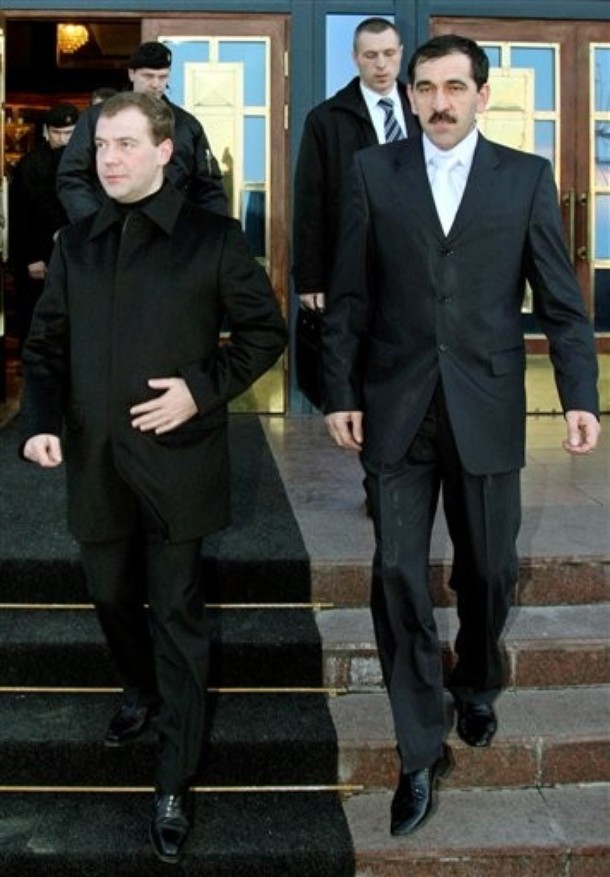
Moscow’s Attempt to Tighten Control over the North Caucasus is Backfiring
Publication: Eurasia Daily Monitor Volume: 6 Issue: 129
By:

The June 22 attack on Ingushetia’s president, Yunus-Bek Yevkurov, which left him badly wounded, has sparked a discussion in Russia over what to do next in the North Caucasus as a whole and in Ingushetia in particular. Moscow’s initial reaction to the attack on president Yevkurov was to give the neighboring Chechen ruler Ramzan Kadyrov a free hand in Ingushetia. The idea was to use Kadyrov’s harsh techniques in Ingushetia in order to quell the resistance forces in the republic (www.kavkaz-uzel.ru, June 23).
This move, however, produced a strongly negative reaction in Ingushetia. The Ingush opposition called for an extraordinary meeting of the Ingush People’s Congress with the main question on the agenda being to ask the Kremlin to appoint Ingushetia’s first president, Ruslan Aushev, as head of the republic (www.ingushetia.org, June 25). Aushev confirmed his willingness to serve as the interim head of the republic until the wounded Yevkurov recovers (Echo Moskvy radio, June 24).
The Ingush opposition could hardly have touched a more sensitive issue for the Kremlin than asking it to appoint Ruslan Aushev as head of the republic. It was the Kremlin that forced Aushev -a military general and hero of the Afghan war- to step down from the Ingush presidency in 2001 because of his unwillingness to support Moscow’s second war in Chechnya and his overall political independence.
Given that the Kremlin’s ruler has remained the same since 2001 -Vladimir Putin- it would be politically damaging and personally hard to accept for Putin, who is now Russia’s prime minister, to admit that he was wrong back in 2001 and allow Aushev to make a political comeback in Ingushetia. Yet Moscow does not have many options in Ingushetia. It has chosen to appoint the republic’s prime minister, Rashid Gaisanov, as temporary head of Ingushetia (RIA Novosti, July 3), but it will eventually have to make a decision on who to appoint on a more permanent basis. Gennady Gudkov, a senior Russian State Duma deputy and security services’ veteran, proposed that direct presidential rule should be introduced in Ingushetia in order to deal with the deteriorating situation in the republic (Interfax, July 5).
This proposal, however, does not provide ways for improving the situation in Ingushetia and simply shows how little the experts in Moscow understand what is going on in the North Caucasus. In fact, Moscow’s policy in the region has led increasingly to direct rule from Moscow over Ingushetia, which so far has yielded largely negative results. Local presidential elections were abolished; the Russian security services acted without much consultation with the local authorities; important political issues on the ground, like the issue of contentious Prigorodny region, were ignored. These moves have led to a situation in which the local elites have virtually ceased to have any stake in a stable situation in Ingushetia. Appointing the current political regime in Ingushetia already constitutes de facto direct rule from Moscow, but rule from the federal center will further alienate the local elites and decrease their willingness to maintain order and stability in the republic.
So the choice for Moscow is very tricky: either to appoint Ruslan Aushev to head Ingushetia and suffer some political damage or to grapple with other candidates and still face humiliation in the face of a worsening security situation there.
The Kremlin’s policy disarray in the North Caucasus is so evident that the authorities sometimes do not even care about the legality of terms that they use when describing their actions. Following the attack on Yevkurov, Russian President Dmitry Medvedev demanded during a meeting of the Kremlin’s Security Council a report on "how many bandits have been killed" (RIA Novosti, June 27). In other words, Medvedev, having vowed on other occasions to install rule of law in Russia, asked not for finding the perpetrators of the crimes in the North Caucasus, but for sheer numbers of the dead "bandits."
For his part, Kadyrov, reacting to heavy losses among Chechen police operating in Ingushetia, said on July 5: "I officially state that those who killed the [Chechen] policemen, will deeply regret this action. They will all be found out and annihilated. Death awaits them in this forest and it will find them in the very near future." Kadyrov’s remarks were readily broadcast by one of the main Russian TV channels -once again without reference to the fact that criminals should be arrested and tried and not simply "annihilated" (Rossiya TV, July 5).
Meanwhile, leadership changes may have taken place not only among the pro-Moscow officials in Ingushetia, but also within the North Caucasus insurgency. Yulia Latynina, a political commentator that writes for the Moscow Times, believes that rebel leader Dokka Umarov is no longer in charge of the insurgents’ operations and that someone else or a group of others are orchestrating the insurgency -something she describes as a mounting problem for Russia’s rule in the region (Echo Moskvy radio, June 27).
Another Northern Caucasus expert, Alexei Malashenko of the Carnegie Moscow Center, said that the latest upsurge of attacks has brought the situation in the region to a qualitatively new stage of development, one which threatens to undermine the whole system of Moscow-imposed governance in the region. The Dagestani expert and academic Abdul-Gamid Bulatov warns that calls to impose a counter-insurgency operation regime across the North Caucasus or at least in Ingushetia, Chechnya and Dagestan, will inevitably lead to a worsening of the situation in the region (Echo Moskvy radio, July 5).
While the thin veil of normalization in the North Caucasus that the Kremlin has carefully created frays, it remains unclear whether Moscow will openly admit it and revert to harsh measures of repression in the region. The challenge of the low-grade insurgency that Moscow faces in the North Caucasus is such that it cannot be dealt with by launching large-scale military operations or even by increasing the presence of the security services. Rather, the region’s challenges should be approached as a complex problem and changes should affect not only the North Caucasus, but the rest of Russia as well. Despite this emerging consensus among experts, Moscow has given few signs that it is considering serious political reforms.




